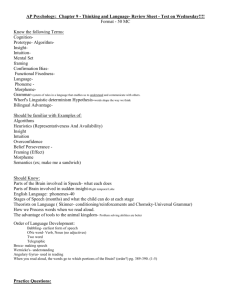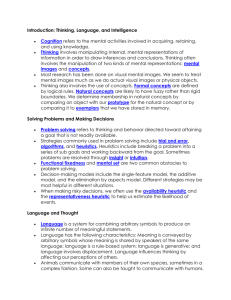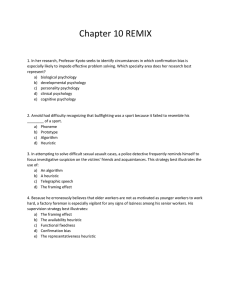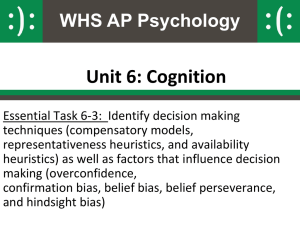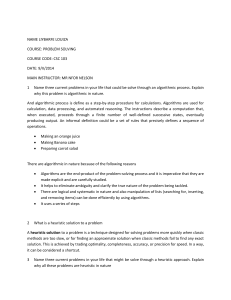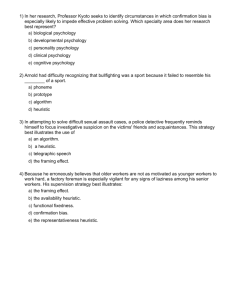8.) Positive reinforcement
advertisement
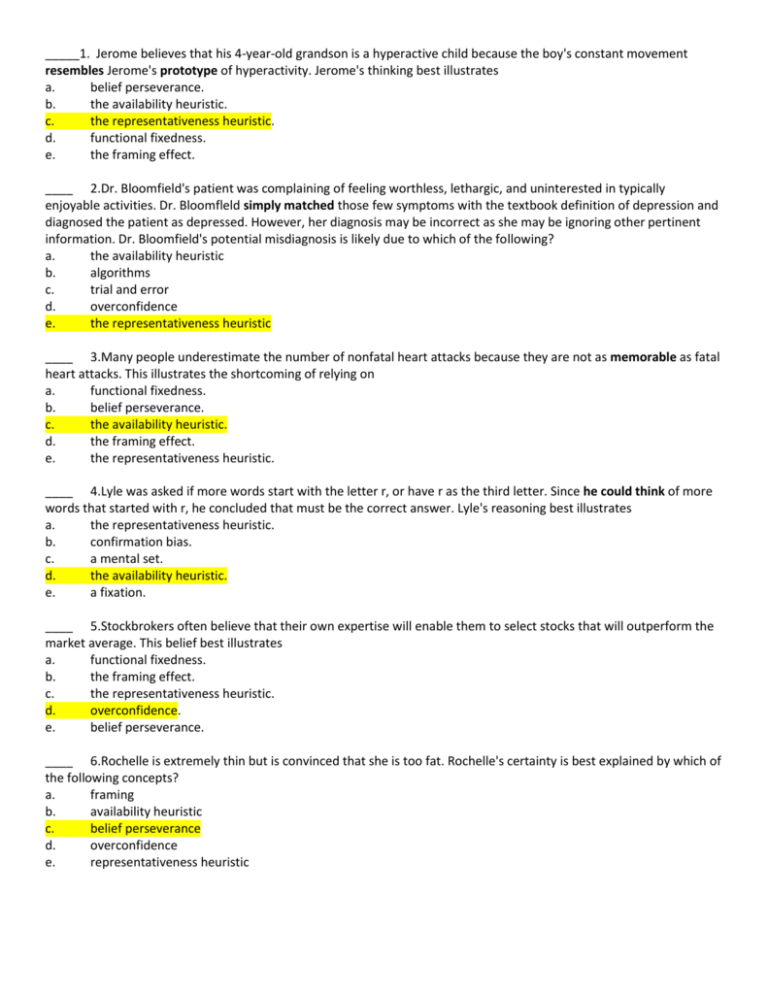
_____1. Jerome believes that his 4-year-old grandson is a hyperactive child because the boy's constant movement resembles Jerome's prototype of hyperactivity. Jerome's thinking best illustrates a. belief perseverance. b. the availability heuristic. c. the representativeness heuristic. d. functional fixedness. e. the framing effect. ____ 2.Dr. Bloomfield's patient was complaining of feeling worthless, lethargic, and uninterested in typically enjoyable activities. Dr. Bloomfleld simply matched those few symptoms with the textbook definition of depression and diagnosed the patient as depressed. However, her diagnosis may be incorrect as she may be ignoring other pertinent information. Dr. Bloomfield's potential misdiagnosis is likely due to which of the following? a. the availability heuristic b. algorithms c. trial and error d. overconfidence e. the representativeness heuristic ____ 3.Many people underestimate the number of nonfatal heart attacks because they are not as memorable as fatal heart attacks. This illustrates the shortcoming of relying on a. functional fixedness. b. belief perseverance. c. the availability heuristic. d. the framing effect. e. the representativeness heuristic. ____ 4.Lyle was asked if more words start with the letter r, or have r as the third letter. Since he could think of more words that started with r, he concluded that must be the correct answer. Lyle's reasoning best illustrates a. the representativeness heuristic. b. confirmation bias. c. a mental set. d. the availability heuristic. e. a fixation. ____ 5.Stockbrokers often believe that their own expertise will enable them to select stocks that will outperform the market average. This belief best illustrates a. functional fixedness. b. the framing effect. c. the representativeness heuristic. d. overconfidence. e. belief perseverance. ____ 6.Rochelle is extremely thin but is convinced that she is too fat. Rochelle's certainty is best explained by which of the following concepts? a. framing b. availability heuristic c. belief perseverance d. overconfidence e. representativeness heuristic 7.) Your little sister says: “Taked cupcake!” Explain how this utterance may illustrate the following language concepts: phoneme, morpheme, telegraphic speech, language acquisition device. The little sister's exclamation contains phonemes (smallest unit of sound that makes up language, like the t sound in “taked”), morphemes (smallest unit of sound with meaning, like the “cup” in “cupcake”), telegraphic speech (“taked cupcake” is not a grammatical sentence, but it conveys meaning), and a language acquisition device (the little sister uses past tense incorrectly by adding an –ed to the end of “take,” which is a common early error of English language users, indicating that all children may use an inborn language acquisition device). Language researchers agree that our language development progresses from babbling to the one-word stage through the two-word, telegraphic speech stage. However, researchers have disagreed about how we acquire language and move from stage to stage. Provide an example of language acquisition that supports the claim that we acquire language through operant conditioning. Your example should show language acquisition progressing from babbling through telegraphic speech: Examples should show language progressing through babbling (spontaneously uttering sounds), and one word (using sounds to convey meaning) through two-word/telegraphic speech (using words together using syntax to convey meaning). and should use the following terms in the correct context: 8.) Positive reinforcement Give an example of language use that is positively reinforced. This example should include a response (language use) followed by a stimulus that increases the likelihood that the response is repeated. For example, students could discuss a child saying “daddy,” followed by the child's father smiling at the child, and the child saying “daddy” again. 9.) Shaping Give an example of language use that is gradually shaped toward a desired response through the reinforcement of progressive approximations of the desired behavior. For example, students could explain that if a mother wants her child to say, “More milk please,” the mother could use positive reinforcement first to condition the child to say “more,” then only reinforce “more milk,” then finally reinforce the desired “more milk please.” 10.) Intermittent reinforcement Example should be of language use that involves a partial reinforcement schedule in which the desired responses are not reinforced each time they occur. For example, students could explain that it is unlikely that a child will be reinforced each time he or she uses language correctly but the intermittent reinforcements will still maintain the child's correct language use. 11). Provide an example of language acquisition that supports the claim that we acquire language because of Chromsky's "inborn universal grammar" theory. Your example should show language acquisition progressing from babbling through telegraphic speech and should use the following idea in the correct context: • Language acquisition device Discuss Chomsky's theorized language acquisition device in the context of their example of language. This discussion should include the idea that this language acquisition device is an inborn, prewired ability to acquire language that is active during childhood. .

